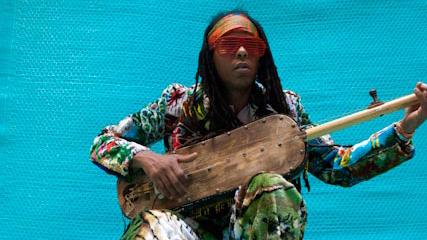Hassan Hakmoun’s new album evokes the sounds of Morocco
Hassan Hakmoun
Hassan Hakmoun grew up in the world of gnawa — a people and culture that came to Morocco by way of West Africa.
Gnawa music and dance are often used in long, trance-healing ceremonies — ceremonies Hakmoun's mother and grandfather used to perform in their home in Marrakesh. So Hakmoun became quite the dancer. When a group of international break dancers, visiting Morocco, saw him dance, they were impressed.
"After we danced, they all came to me with a translator to talk to me," Hakmoun says. When they asked how he danced like that, "I said, 'when we meet in the states, I'm gonna show you."
That chance encounter led to a dance tour that took him to the United States. In New York City, he found like-minded musicians, eager to explore new sounds. He developed a style that layers rock, jazz and blues on top of the gnawa rhythms and melodies laid down by a three-stringed sintir — a skin-covered bass. In the early 1990s, he recorded an album of his songs with some similarly expansive musicians, including legendary jazz trumpeter Don Cherry.
Soon after, he got a call from England. It was Peter Gabriel. And he wanted to sign Hakmoun.
Hakmoun's answer: "Maybe, but who are you?"
Luckily, Hakmoun's roommate know who Gabriel was, and encouraged him to collaborate with the legendary singer-songwriter, musician, humanitarian activist, and first vocalist for the rock band Genesis.
Hakmoun put an album out on Gabriel's global music label Real World, and spent months touring with him."
Today, though, Hakmoun sees little use for record labels. He self-released his new album, "Unity," his first in 12 years. The album has all of the rock but less of the polish of some of his earlier albums. That's intentional — he and the producer wanted it to sound more African. In Morocco, sometimes instead of having fancy amplifiers and speakers, the band will be playing through what looks like a huge megaphone.
"They put them on the roof, and they have a wedding and you can hear that sound. It's very special," says Hakmoun. "There's no speakers, nothing — just a big horn and the voice coming out of it. And also some amplifiers there are very old and the sound is different, and raw."
While the album's sound evokes a certain place, it takes up universal themes that Hakmoun has been mulling for awhile: spirituality and mortality, the senselessness of war. In the song "Hamadiyi," he says a prayer for sisters and brothers who have died.
"Now in Syria, for three years now, and in Ukraine and Russia, they keep going. And to me, the evil, and the satans are watching and happy and excited to see these things," says Hakmoun. "People killing one another over something that actually doesn't belong to no one."
Hassan Hakmoun grew up in the world of gnawa — a people and culture that came to Morocco by way of West Africa.
Gnawa music and dance are often used in long, trance-healing ceremonies — ceremonies Hakmoun's mother and grandfather used to perform in their home in Marrakesh. So Hakmoun became quite the dancer. When a group of international break dancers, visiting Morocco, saw him dance, they were impressed.
"After we danced, they all came to me with a translator to talk to me," Hakmoun says. When they asked how he danced like that, "I said, 'when we meet in the states, I'm gonna show you."
That chance encounter led to a dance tour that took him to the United States. In New York City, he found like-minded musicians, eager to explore new sounds. He developed a style that layers rock, jazz and blues on top of the gnawa rhythms and melodies laid down by a three-stringed sintir — a skin-covered bass. In the early 1990s, he recorded an album of his songs with some similarly expansive musicians, including legendary jazz trumpeter Don Cherry.
Soon after, he got a call from England. It was Peter Gabriel. And he wanted to sign Hakmoun.
Hakmoun's answer: "Maybe, but who are you?"
Luckily, Hakmoun's roommate know who Gabriel was, and encouraged him to collaborate with the legendary singer-songwriter, musician, humanitarian activist, and first vocalist for the rock band Genesis.
Hakmoun put an album out on Gabriel's global music label Real World, and spent months touring with him."
Today, though, Hakmoun sees little use for record labels. He self-released his new album, "Unity," his first in 12 years. The album has all of the rock but less of the polish of some of his earlier albums. That's intentional — he and the producer wanted it to sound more African. In Morocco, sometimes instead of having fancy amplifiers and speakers, the band will be playing through what looks like a huge megaphone.
"They put them on the roof, and they have a wedding and you can hear that sound. It's very special," says Hakmoun. "There's no speakers, nothing — just a big horn and the voice coming out of it. And also some amplifiers there are very old and the sound is different, and raw."
While the album's sound evokes a certain place, it takes up universal themes that Hakmoun has been mulling for awhile: spirituality and mortality, the senselessness of war. In the song "Hamadiyi," he says a prayer for sisters and brothers who have died.
"Now in Syria, for three years now, and in Ukraine and Russia, they keep going. And to me, the evil, and the satans are watching and happy and excited to see these things," says Hakmoun. "People killing one another over something that actually doesn't belong to no one."
Our coverage reaches millions each week, but only a small fraction of listeners contribute to sustain our program. We still need 224 more people to donate $100 or $10/monthly to unlock our $67,000 match. Will you help us get there today?
